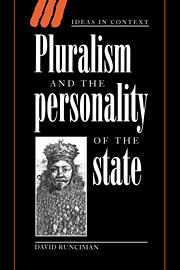1 - Introduction
Published online by Cambridge University Press: 10 November 2009
Summary
The question of how men form themselves into associations lies at the heart of Western political thought. An association is a group of human beings possessed of a distinct, formal identity based on the relation subsisting between its members, and it may fairly be said that it is around such groups that our political understanding has been constructed. The most prominent of these groups is the state, or civil association, and though the state can be regarded as an association sui generis, to be understood in its own terms, it has commonly been understood in terms of the associations that it contains. Sometimes it has literally been built out of them, a construct of the separate associations of ruling and ruled, government and people. As often it has been seen as analogous to the other associations in which men are familiarly to be found. Some of these associations have a natural existence, like the family, from which the Aristotelian polis is evolved. Others exist within particular systems of law, and, like the Roman or medieval corporation, may offer a model of considerable theoretical complexity to which the state can be compared. In each case, the state's identity rests on the identity of associations other than itself. And so not only must there be at least one association if there is to be a state, the character of that association will frequently depend on what is taken to characterise the business of association per se.
Information
- Type
- Chapter
- Information
- Pluralism and the Personality of the State , pp. 3 - 5Publisher: Cambridge University PressPrint publication year: 1997
